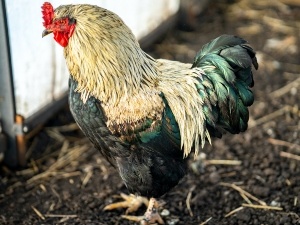
A chicken’s beak is one of the most important parts of the bird, without the beak the bird can’t forge for food or preen itself. If a bird can’t eat then it will soon die, if the bird can’t preen itself then this can lead to a whole host of problems
Thus, treating any issues that your bird has as soon as possible is a must. If you find that your chicken is missing its top beak you’d be right to be concerned, this article looks into why that may be happening and what to do.
Table of Contents
Chicken missing its top beak:
Chicken beaks are quite sturdy, they are made up of keratin which is the same material that human fingernails are made out of.
Chicken beaks are quite strong but not impenetrable, here is why your bird may be missing its top beak
Injury:
A chicken beak may be quite strong and hard but this doesn’t mean that the beak is impenetrable. If enough pressure is added to the beak then the beak may break
A chicken’s beak can break if the bird gets attacked by a predator and the beak gets ripped off while the chicken is trying to get away, or, if the bird gets into a fight with another bird and its beak breaks off mid-fight.
The beak can also break if the bird gets its beak stuck in a small space, it can also break if the bird gets its beak stuck somewhere it shouldn’t, like in an auger on an automatic feeder.
A bird that has lost its beak in this way will not only lose the ability to eat and preen as it normally would, but it will also be in great pain.
The bird may be in great pain but it will avoid showing the signs that it is in pain to keep predators from attacking it, and, to keep the other members of the flock from attacking it as well.
If the beak broke easily then the bird may be stuffing from nutritional deficiencies, liver issues, or mites. These can all weaken the bird’s beak.
You would need to examine the bird to assess whether this was the reason for the weak beak and correct the problem.
What to do:
A bird with a broken beak will have to eat differently from the other birds until its beak can grow back.
The beak will grow back but it won’t exactly grow back the same way, especially if a large portion of the bird’s beak was broken.
The beak should however grow back well enough that the bird can feed, drink and preen adequately.
In the meantime, you can give the bird foods that won’t hurt to eat like applesauce, baby food, and mashed potatoes.
You may need to modify the bird’s environment to keep the bird from injuring its beak even more. This may include closing up any holes, with a soft material.
If the injury is quite bad, then you would need to take the bird to the vet. The vet will be able to assess the injury and offer treatment. Treatment options include filling the beak using dental acrylic using a 3D printer.
Avoid trying to glue the beak back on using super glue or any other type of adhesive. If you do decide to do this then you would be sealing off the bacteria at the broken end of the beak and possibly causing an infection.
Giving the bird aspirin for the pain can be helpful but you would need to contact your vet about doing this before you do it.
Beak treat:
If you’ve just received your chicken, and the bird was a commercial layer, a hyline, or a shaver, then the bird was likely “beak treated” before you got the bird.
Beak treating, also called “debeaking” is when a high-intensity infrared laser beam is used to heat treat the tissue on the bird’s beak.
The bird’s beak doesn’t fall off immediately, but the treatment does cause the sharp hook of the bird’s beak to erode after some time.
This is done to keep birds from pecking at each other
Beak treat can be done when the bird is a day old, five to ten days old, four to six weeks old, and eight to twelve weeks old, and if needed touch-ups are done to the bird’s beak if it grows too much.
What to do:
As long as the bird is acting happy and doesn’t seem to be showing any signs of distress then the bird should be fine.
If the bird is having trouble eating then you can feed the bird some mash or crumbly stuff in a deep dish, this way the bird can scoop the feed up and eat.
If you enjoyed this article then you may also be interested in other chicken related articles. Here are some articles that you may be interested in: Mold In Chicken Coop, Chicken Has A Broken Leg At The Hip, Chicken Beak Peeling, Growth On Chicken Beak, Baby Chick Not Moving

